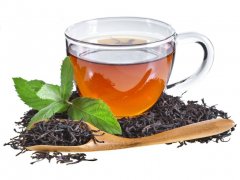What is the effect and function of imported Ceylon blended black tea? Where is the best place for Sri Lankan black tea?
Ceylon tea, black tea and green tea
Ceylon tea is simply any tea produced in Sri Lanka, including all kinds of tea, including green, black and white tea. These different types of tea may differ in the way they are processed, but those grown and harvested in Sri Lanka are still classified as Ceylon tea.
Ceylon tea is comparable in efficacy to green tea, white tea and black tea. Ceylon tea, like other types of tea, is rich in antioxidants that help prevent oxidative stress and free radical formation. It may also have significant health benefits and may be associated with a reduced risk of some chronic diseases.
In terms of taste and aroma, Ceylon tea is said to be richer and bolder than teas from other regions. It is also rich in a variety of important polyphenols, including myricetin, quercetin and kaempferol, all of which may be its healthful properties.
history
Ceylon tea can be traced back to 1824, when the British first brought tea trees from China to Sri Lanka. It was planted at the Royal Botanic Gardens of Paradinia and is still considered the first non-commercial Ceylon tea tree to be found in Sri Lanka.
Englishman James Taylor is credited with introducing tea cultivation to Sri Lanka. After visiting India to learn how to grow tea on plantations, he went to Sri Lanka and started the first Ceylon plantation on a 19-acre estate in 1867. Just a few years later, in 1872, he opened his first tea factory, and Ceylon tea exports rapidly increased to all parts of the world. Before long, Ceylon tea's popularity reached new heights. In 1893, a million tea bags were sold at the Chicago World's Fair. By 1965, Sri Lanka had become the world's largest tea exporter.
Today, tea is considered the most widely consumed beverage after water, with two-thirds of the world's population drinking tea. (21)Ceylon tea remains one of the most common varieties of tea, with millions of pounds of tea exported worldwide each year.
precautions
While Ceylon tea has many impressive health benefits, it's important to combine it with a nutritious diet and healthy lifestyle to maximize its potential impact on health. Also, be sure to maintain moderate intake, limiting it to one or two cups per day to help avoid negative side effects.
Keep in mind Ceylon tea contains caffeine and excessive consumption can lead to bad symptoms. Especially for pregnant women, it is recommended to limit caffeine intake to less than 200 mg per day to avoid negative side effects. Reusing previously steeped tea leaves or limiting tea steeping time are two effective ways to help reduce caffeine content in tea leaves and minimize the risk of adverse symptoms.
Finally, if you experience any negative symptoms after drinking Ceylon tea, be sure to reduce your intake or stop using it. If side effects persist, consider talking to your doctor or trusted healthcare professional.
ultimate idea
Ceylon tea refers to any tea produced in Sri Lanka, Sri Lanka formerly known as Ceylon. Although black Ceylon tea is the most common type, there are other forms of Ceylon tea, including white tea and green tea.
Ceylon tea's most notable benefit is its rich polyphenol content, which can help prevent chronic diseases such as cancer. Other potential benefits of Ceylon tea include increased fat burning, lower cholesterol levels, enhanced brain function and better blood sugar control.
Ceylon tea does contain caffeine, which can cause negative side effects. Drinking large amounts of tea may also cause adverse symptoms, such as impaired iron absorption. However, it is generally considered safe for most people.
From iced drinks to smoothies and soups, Ceylon tea has many unique ways to add to your daily routine, allowing you to take full advantage of the many benefits it has to offer.
Important Notice :
前街咖啡 FrontStreet Coffee has moved to new addredd:
FrontStreet Coffee Address: 315,Donghua East Road,GuangZhou
Tel:020 38364473
- Prev

Which is better, Ceylon black tea, highland tea or lowland tea? Recommended by the most famous brand of Ceylon black tea
Ceylon tea is a safe and healthy dietary additive for most people if you drink it in moderation. However, it does contain caffeine, which may have side effects on some people. Ceylon tea usually contains 23-110 milligrams of caffeine per 8 ounces. This is usually lower than the caffeine content of a cup of coffee, which is about 95 milligrams per cup of coffee, but according to
- Next

Black tea, ctc or bop? Interpretation of Black Tea nutritional value composition Table by ctc Black Tea grading system
Tea is actually the most frequently consumed drink in the world after water, so you probably have the benefits of black tea on a regular basis. But is black tea good for you? It is rich in antioxidants called polyphenols, which can protect human cells from harmful free radicals and is definitely one of my favorite anti-aging foods. In addition, black tea can also improve mental vigilance and health.
Related
- Beginners will see the "Coffee pull flower" guide!
- What is the difference between ice blog purified milk and ordinary milk coffee?
- Why is the Philippines the largest producer of crops in Liberia?
- For coffee extraction, should the fine powder be retained?
- How does extracted espresso fill pressed powder? How much strength does it take to press the powder?
- How to make jasmine cold extract coffee? Is the jasmine + latte good?
- Will this little toy really make the coffee taste better? How does Lily Drip affect coffee extraction?
- Will the action of slapping the filter cup also affect coffee extraction?
- What's the difference between powder-to-water ratio and powder-to-liquid ratio?
- What is the Ethiopian local species? What does it have to do with Heirloom native species?

